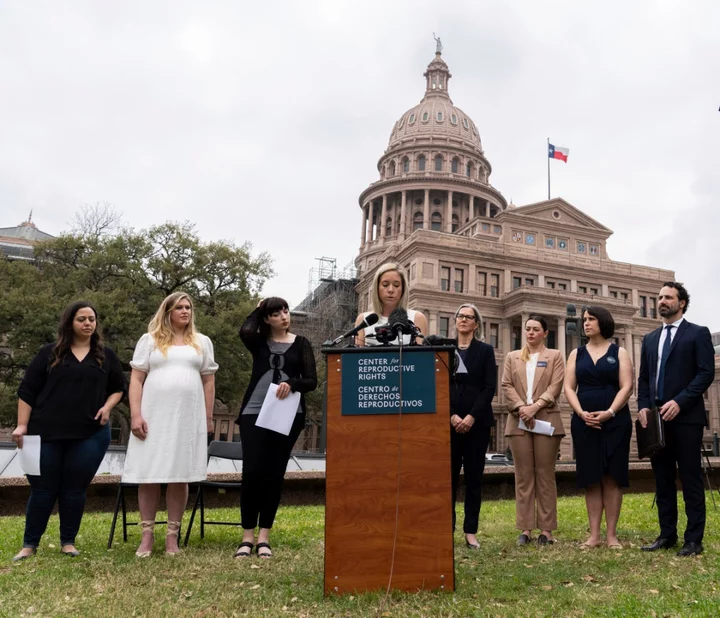
Texas women suing over anti-abortion law give historic and heartbreaking testimony in a landmark court case
In March, unable to legally obtain abortion care in Texas, Samantha Casiano was forced to carry a nonviable pregnancy to term, and gave birth to a three-pound baby who died hours later. Ms Casiano is among 13 women denied emergency abortion care under state law who are suing the state in a landmark case that is now in front of a Texas judge. In harrowing, historic courtroom testimony in Austin on 19 July, Ms Casiano and two other plaintiffs described their agony, isolation and heartbreak as they detailed their traumatic, life-threatening pregnancies and the state’s failure to care for them. As she described her experience to the court through tears, Ms Casiano vomited from the witness stand. “I watched my baby suffer for four hours,” she said in her testimony. “I am so sorry I couldn’t release you to heaven sooner. There was no mercy for her.” Abortion rights legal advocacy group Center for Reproductive Rights Texas filed the lawsuit on behalf of the women in March to force Texas authorities to clarify emergency medical exceptions to the state’s overlapping anti-abortion laws, marking the first-ever case brought by pregnant patients against such laws. Their testimony has underscored the depth of impacts from Texas laws and similar anti-abortion laws across the country, with abortion access stripped away for millions of Americans who are now exposed to dangerous legal and medical minefields during their pregnancies. The conflicting exemptions for medical emergencies in Texas have resulted in widespread confusion among providers and hospitals fearing legal blowback or severe criminal penalties, according to abortion rights advocates. Healthcare providers in the state found in violation of those laws could lose their medical license, face tens of thousands of dollars in fines, or receive a sentence of life in prison. The plaintiffs “suffered unimaginable tragedy” directly because of the state’s anti-abortion laws, Center for Reproductive Rights attorney Molly Duane said in her opening arguments. Texas officials and the state’s medical board have “done nothing” to clarify the law, she said. “I feel like my hands are tied,” said Houston obstetrician-gynecologist Dr Damla Karsa. “I have the skill, training and experience to provide care but I’m unable to do so. It’s gut-wrenching. I am looking for clarity, for a promise that I’m not going to be prosecuted for providing care.” Attorneys for the state have sought to dismiss the case altogether, arguing in court filings that the women lack standing to challenge the law because it is ultimately uncertain they will face similar complications again, that their “alleged prospective injuries are purely hypothetical”, and that some of the plaintiffs admitted they have since “struggled to become pregnant” again after their traumatic experiences. Amanda Zurawski, the lead plaintiff in the case, is still hoping to become pregnant after her life-threatening pregnancy. She called the state’s argument “infuriating and disgusting and ironic.” “Do they not realise the reason why I might not be able to get pregnant again is because of what happened to me as a result of the laws that they support?” she told the court. “Anybody who’s been through infertility will tell you it is the most isolating, grueling, lonely, difficult thing a person can go through.” ‘I wished I was dreaming. I knew I wasn’t’ Ms Casiano, a mother of four, was hoping for a girl. When she visited her physician for a checkup last September, “all of a sudden the room went cold” and quiet, she testified. Her daughter was diagnosed with anencephaly, a fatal birth defect in which a baby is born without parts of a brain or skull. “My first thought was … ‘maybe it’s a surgery, maybe she can be fixed,’ and then she said, ‘I’m sorry, but your daughter is incompatible with life, and she will pass away before or after birth,’” Ms Casiano said. “I felt cold,” she said. “I was hurt. I wished I was dreaming. I knew I wasn’t. I just felt lost.” A case worker at her obstetrician’s office gave her a pamphlet with funeral homes. She was prescribed antidepressants. She could not be referred for abortion care anywhere in the state. Texas was the first to implement a near-total ban on abortion, months before the US Supreme Court struck down the constitutional right to abortion last June, a decision that triggered a wave of state laws and legislation from anti-abortion lawmakers and governors to restrict care and threaten providers with criminal penalties. Amanda Zurawski endured several rounds of fertility treatments, tests, surgeries and misdiagnoses before learning she was pregnant in May of last year. “We were at first in shock … we were over-the-moon excited,” Ms Zurawski said. But her obstetrician discovered that she dilated prematurely, and soon after her membranes ruptured, draining amniotic fluid and endangering the life of her expected child. Doctors informed her there was nothing they could do under what was recently enacted state law, despite knowing with “complete certainty we were going to lose our daughter,” she said. The condition led to life-threatening sepsis. Doctors ultimately induced labor. Her daughter, which she named Willow, was not alive when she delivered. Ms Zurawski and her husband are still trying for pregnancy, but the trauma has closed one of her fallopian tubes, and a doctor had to surgically reconstruct her uterus. They also are considering in vitro fertilization, surrogacy and adoption. She previously testified to members of Congress about her experience, a story she will continue to tell, even if it is “excruciating” to do so, she told the Texas courtroom. “I know that what happened to me is happening to people all over the country. … So many people are being hurt by similarly restrictive bans,” she said. She has spoken out “because I can, and I know a lot of people who are experiencing or will experience something similar who can’t speak out, and it’s for those people I will,” she said. Healthcare providers caring for pregnant patients in the months after the Supreme Court’s decision to overturn Roe v Wade have faced severe obstacles for providing standard medical care in states where abortion is effectively outlawed, leading to delays and worsening and dangerous health outcomes for patients, according to a first-of-its-kind report released earlier this year. Individual reports from patients and providers like those named in the Texas lawsuit have shed some light on the wide range of harm facing pregnant women in states where access to abortion care is restricted or outright banned. But reporting from the University of California San Francisco captures examples from across the country, painting a “stark picture of how the fall of Roe is impacting healthcare in states that restrict abortion,” according to the report’s author Dr Daniel Grossman. More than a dozen states, mostly in the South, have effectively outlawed or severely restricted access to abortion care after the Supreme Court’s decision in Dobbs v Jackson Women’s Health Organization last June. The decision has also opened new legal challenges, ones that could once again reshape the future of abortion access in America, while anti-abortion lawmakers and Republican candidates face a public that is overwhelmingly against such bans. ‘I don’t feel safe to have children in Texas anymore’ Ashley Brandt sent a picture of an ultrasound to her husband when she found out she was pregnant with twins. But after her 12-week ultrasound last May, doctors discovered one of the twins had acrania, in which the skull of the fetus is not formed, and brain tissue is exposed to amniotic fluid. The condition is fatal. Despite no chance of the twin’s survival, Ms Brandt was not eligible under Texas law for a procedure called a selective fetal reduction; Twin A still had some signs of life, like muscle spasms and cardiac activity. They traveled to neighbouring Colorado for care, and she returned home the day after the procedure. She gave birth to her daughter in November. “If I had not gone out of state and just done what was legal in Texas, my daughter … would likely have been in the [neonatal intensive care unit],” she said. “All of my ultrasounds leading up to labor I would have had to watch twin A … deteriorate more and more, every ultrasound. … I would have to give birth to an identical version of my daughter without a skull, without a brain, and I would have to hold her until she died, and I would have to sign a death certificate, and hold a funeral.” She said the state has failed to account for medical emergencies like hers. “I don’t feel safe to have children in Texas anymore,” she said. “It was very clear that my health didn’t really matter, that my daughter’s health didn’t really matter.” Read More ‘I felt I couldn’t tell anyone’: The stigma of abortion keeps women silent. It’s time for us to shout Ohio voters are likely to decide the future of abortion rights One year after Roe v Wade fell, anti-abortion laws threaten millions. The battle for access is far from over
1970-01-01 08:00
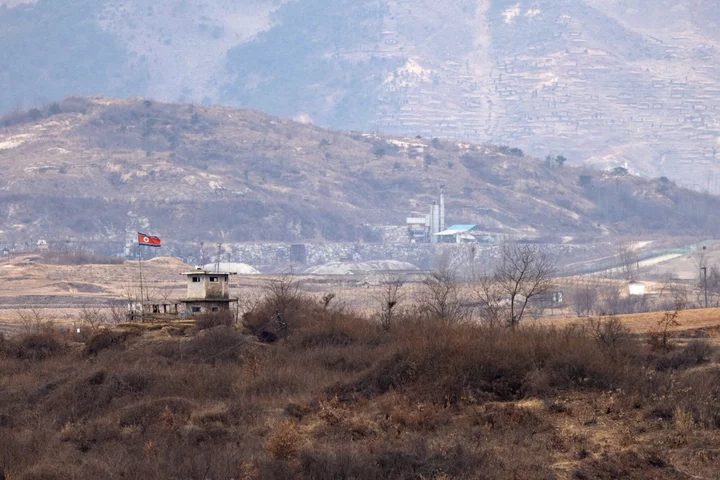
What We Know About the US Soldier Who Fled to North Korea
About 20 Americans have been detained by North Korea since the end of the 1950-1953 Korean War, including
1970-01-01 08:00
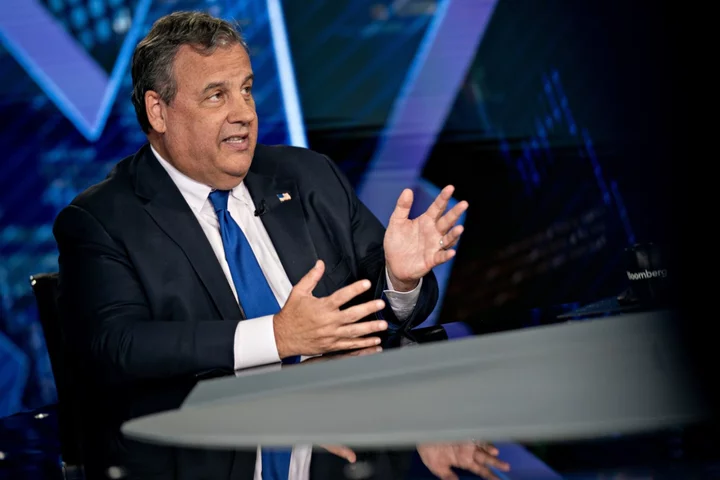
Christie Calls Classified Documents Case Worst of Trump’s Charges
Former New Jersey Governor Chris Christie said Donald Trump faced significant legal peril from accusations that he mishandled
1970-01-01 08:00
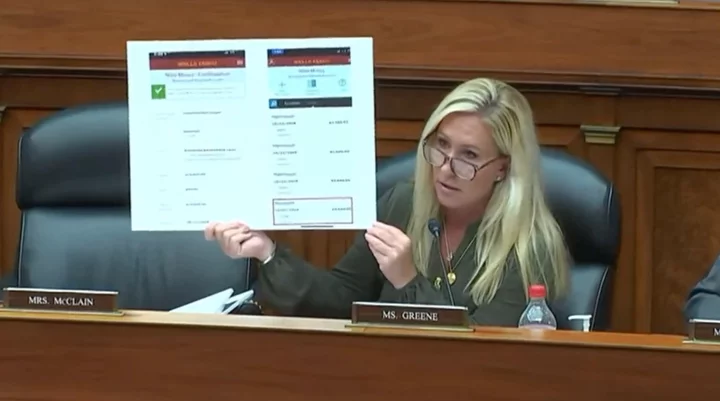
Marjorie Taylor Greene sparks outrage by showing explicit photos of Hunter Biden at congressional hearing
During a Republican-led oversight committee hearing regarding IRS whistleblowers connected to a probe into President Joe Biden and his son Hunter Biden, Marjorie Taylor Greene showed explicit photos of the president’s son on posters. The Georgia Republican held up a series of posters with images of Hunter Biden naked and photos of him engaging in sexual acts at the Congressional hearing on Wednesday. “Marjorie Taylor Greene is literally showing dick pics at our Oversight Hearing,” California congressman Robert Garcia tweeted. “Marjorie Taylor Greene is currently brandishing Hunter Biden nudes during a House hearing. I’m not going to post it. Disgusting,” journalist Aaron Rupar tweeted, adding: “Your taxpayer dollars paid for Marjorie Taylor Greene to print Hunter Biden nudes on poster board so she could pull this stunt during a House hearing.” The Lincoln Project tweeted: “The GOP is getting teachers fired for teaching sex ed while the GOP shows porn on the House floor.” Florida Republican Byron Donalds came to her defence: “According to @RepRaskin & @danielsgoldman, the explicit images of Hunter Biden presented by @RepMTG are TOO RACY for the Oversight Committee & demanded they go away. These are the same Democrats that want this material IN OUR KIDS’ SCHOOLS. Please spare me the outrage.” “I wonder how many hours MTG has spent reviewing the Hunter Biden videos and images. Deep and penetrating analysis,” lawyer Brad Moss mused. “Before we begin, I would like to let the committee and everyone watching at home that parental discretion is advised,” the Georgia Republican said as she started her questioning. “Hunter recorded multiple sex tapes with a prostitute he had paid for out of his law firm’s bank,” one poster read. On another poster, which depicted a blown up airline ticket, Ms Greene pointed to Hunter Biden’s name saying it showed that he purchased the ticket “for this woman,” she said, pointing to a woman’s naked bottom half. She then asked the witness: “I would like to point out that if he was purchasing a plane ticket for her for sex and traveling across state lines, do you believe that to be a violation of the Mann Act?” The Mann Act, a federal law, makes it illegal to transport “any woman or girl for the purpose of prostitution or debauchery, or for any other immoral purpose.” The witness didn’t fully answer the question when the Georgia congresswoman held up another explicit photo, saying “Hunter Biden paid for this woman to do this with him.” The House panel’s top Democrat Jamie Raskin at one point interjected: “Should we be displaying this in the committee?” New York Democratic Rep Alexandria Ocasio-Cortez also called out the Georgia Republican’s moves, seeming to point out similarities between claims against Hunter Biden and Florida Rep Matt Gaetz: “If the gentlelady from Georgia wanted to follow evidence, we should also take a look at, hypothetically ... sex trafficking charges against a 17-year-old girl…” Prosecutors investigated whether Mr Gaetz may have been involved in a scheme to traffic a 17-year-old girl. However, in February the Department of Justice told him that no charges would be brought against him. Mr Gaetz had repeatedly denied any wrongdoing. Read More Biden’s latest campaign video is a Marjorie Taylor Greene speech Marjorie Taylor Greene attacks special counsel Jack Smith as ‘little b****’ for Democrats Republican claims of Biden family ‘corruption’ are being undermined by their own whistleblowers GOP claims of Biden family ‘corruption’ undermined by their own whistleblowers Watch live: IRS agent Gary Shapley testifies on Hunter Biden investigation IRS whistleblowers to testify to Congress as they claim 'slow-walking' of Hunter Biden case
1970-01-01 08:00

Asda Boss Grilled by UK Politicians Over Rocketing Fuel Prices
British politicians have accused the boss of Asda of pushing up prices, lowering wages and taking money out
1970-01-01 08:00
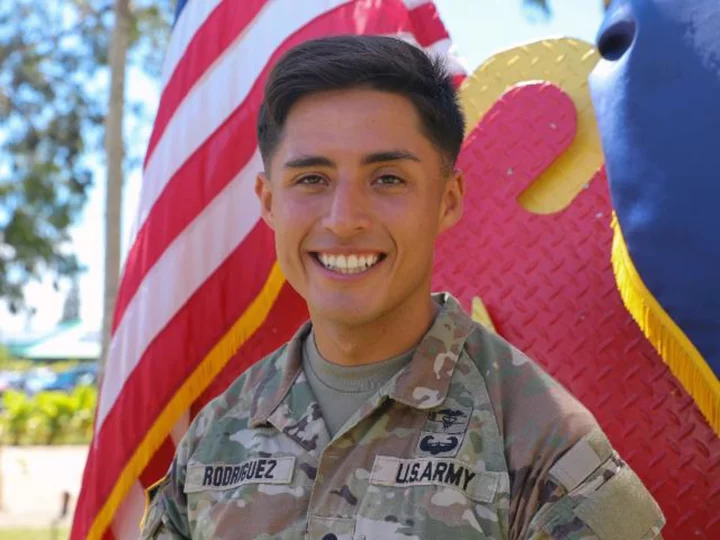
US soldier to receive highest peacetime award for heroism after defending woman
A US soldier in Hawaii is receiving the military's highest award for valor not in combat on Wednesday for saving a woman's life and repeatedly fighting off a man who was attacking her.
1970-01-01 08:00

How Putin just spiked worldwide wheat prices
Russian President Vladimir Putin appears to have declared open season on Ukraine's consequential grain exports, targeting the port city of Odesa with new ferocity and jeopardizing worldwide food prices.
1970-01-01 08:00
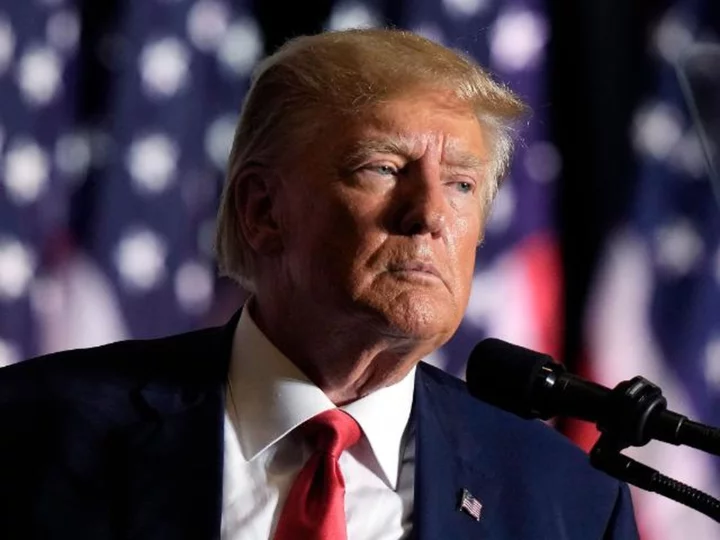
Judge denies Trump bid to move hush money case to federal court
A federal judge on Wednesday denied Donald Trump's effort to move the New York indictment charging him with falsifying business records into federal court, finding that Trump failed to show that any of the allegedly illegal conduct related to his role as president.
1970-01-01 08:00
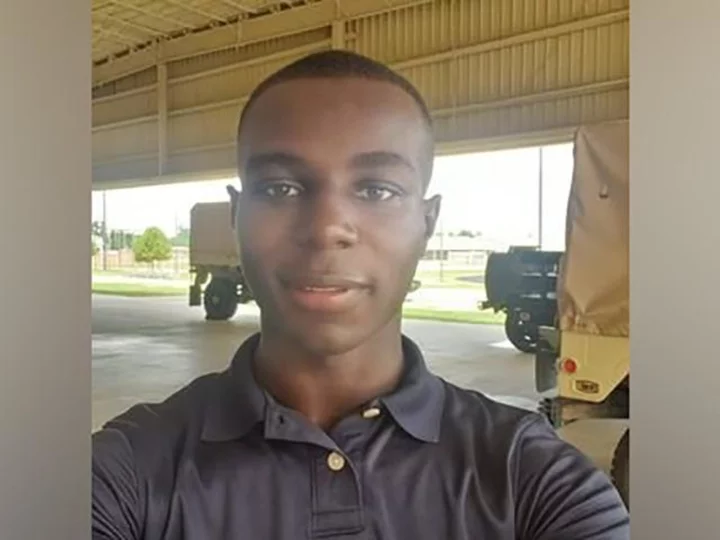
'He was going so fast': US officials try to piece together why soldier bolted into North Korea
Just one day before crossing into North Korea, Private Travis King texted his US military handlers to let them know he had arrived at his gate at Incheon Airport in Seoul and was preparing to board a plane back to the US.
1970-01-01 08:00
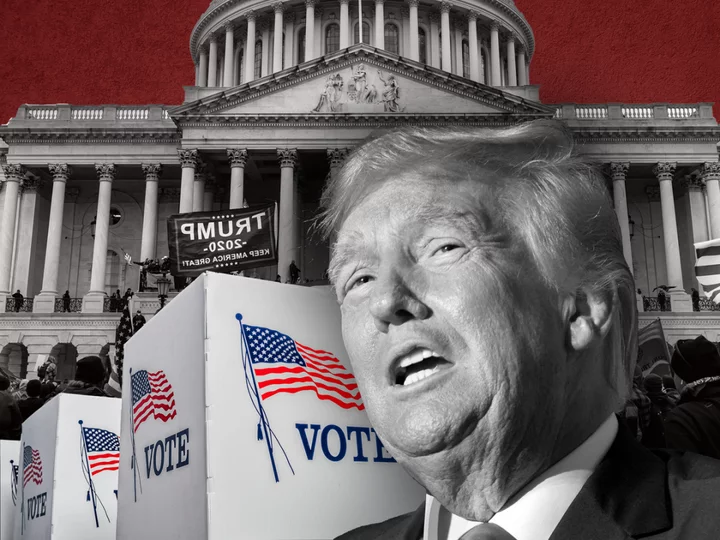
Trump, January 6 and a conspiracy to overturn the 2020 election: The federal investigation, explained
Indictments are imminently expected following a federal investigation into efforts from Donald Trump and his allies to subvert the outcome of the 2020 presidential election. The former president announced he received a target letter – a document formally indicating he is the subject of an investigation – in connection with a sprawling US Department of Justice special counsel probe into an alleged scheme to preserve Mr Trump’s presidency against the wills of millions of voters. A case will not likely be revealed in full until an indictment is unsealed in US District Court, but a wealth of evidence uncovered by members of Congress and in other documents suggests that the former president and potential co-defendants could be prosecuted in what would be a second round of federal charges against him. A House select committee spent a year and a half investigating the events surrounding and leading up to the attack on the US Capitol on 6 January, 2021, including a series of blockbuster public hearings laying out evidence and witness testimony describing the depth of Mr Trump’s attempts to remain in office at whatever cost. The panel’s final 845-page report provides a detailed account of Mr Trump’s refusal to cede power – regardless of the outcome of a democratic election – while privately acknowledging that he lost, as his baseless “stolen election” narrative fuelled his supporters to riot in the halls of Congress, an argument that also bolstered his second impeachment in the House of Representatives. In December, lawmakers on the House committee unanimously voted to recommend charges against the former president, claiming that there is enough evidence to prosecute him for at least four crimes – including aiding or providing comfort to an insurrection aimed at toppling the United States government. The panel also referred Mr Trump to the Justice Department for the obstruction of an official proceeding, conspiracy to defraud the US, and conspiracy to make a false statement to the federal government. John Eastman, the attorney who argued that Mr Pence could reject election results, and Kenneth Chesebro, who helped develop the fake elector scheme, were also implicated in the committee’s report, along with former White House chief of staff Mark Meadows, attorney Rudy Giuliani, and former assistant US Attorney General Jeffrey Clark. It was a mostly symbolic vote, marking the culmination of the committee’s months-long investigation, but it sent a powerful signal from a bipartisan group of lawmakers bolstered by mountains of evidence that a former president should be held accountable for his alleged crimes against the government. That report and countless investigations into the events surrounding January 6 have painted the attack on the Capitol as part of a much-larger effort to preserve a fragile American democracy in a volatile battle to determine the truth and who wields it. Who is under investigation? The Justice Department, meanwhile, had separately been investigating Mr Trump’s rejection of 2020 results, building on the years of work from federal prosecutors to investigate more than 1,000 people in connection with the January 6 attack on the US Capitol, fuelled by the former president’s ongoing false claims that the election was rigged against him. Prosecutors have talked to a number of chief aides and officials in Mr Trump’s circle, including Mr Pence, White House chief of staff Mark Meadows, former attorney Rudy Giuliani, former White House counsel Pat Cipollone, his former deputy Pat Philbin, and former National Security Adviser Robert O’Brien, among several others. They also have spoken with Georgia Secretary of State Brad Raffensperger, who was on the other end of a call with Mr Trump demanding that the state’s top elections official “find 11,780 votes” – enough for him to overturn Mr Biden’s victory in the state. That call, which was taped, also is at the centre of a separate investigation from Fulton County District Attorney Fani Willis into election interference in the state. Arizona – ground zero for an election denialism movement that gave rise to leading GOP candidates for the top three statewide offices, including failed candidate for governor Kari Lake – was a focal point for the Trump campaign and his allies, who filed several lawsuits against the state and some counties in an attempt to overturn the lawful results. Mr Biden won the state by roughly 10,000 votes. Federal prosecutors have talked to former Arizona Governor Doug Ducey, who silenced a call from Mr Trump while Mr Ducey was in the middle of certifying his state’s election results – a process that was being live-streamed and carried across news outlets. Mr Smith’s office also subpoenaed the office of Arizona Secretary of State and has met with top elections officials in Wisconsin, New Mexico and Pennsylvania. Prosecutors also have interviewed Michigan Secretary of State Jocelyn Benson, whose office provided a tranche of documents that included communications between the state’s election officials and Mr Trump’s former lawyers and members of his campaign as the former president’s allies targeted the critical battleground state. Central to the investigation is whether Mr Trump knew that he lost but pressed ahead with spurious efforts to overturn results anyway, with federal prosecutors reportedly speaking to his son-in-law and former adviser Jared Kushner and former communications directors Hope Hicks and Alyssa Farah Griffin with those questions in mind. What charges could prosecutors bring against Trump? Based on evidence uncovered by the select committee and other filings and reporting, prosecutors are likely investigating several key elements of the sprawling effort to reverse the 2020 election: Mr Trump’s lies about the outcome, his campaign’s attempts to pressure state officials and push false slates of electors to obstruct the certification of the results, a failed attempt to persuade Mr Pence to refuse the outcome, and Mr Trump’s failure to stop a mob of his supporters from breaking into the Capitol. Mr Trump knew he had lost the election but continued to pursue efforts to remain in power, including the so-called alternate elector scheme to fraudulently certify the results submitted to Congress, prosecutors are likely to argue. On 18 July, Michigan attorney general Dana Nessel charged 16 “fake” electors in that state, marking the first criminal charges brought against so-called “alternate” electors who sought to overturn 2020 results. Charges against Mr Trump and others connected to those allegations and similar attempts in other states could include conspiracy to defraud the United States in the administration of elections, the obstruction of an official proceeding, and wire and mail fraud. Obstruction The target letter from federal prosecutors to Mr Trump cites three statutes that the former president likely violated in his attempts to reverse the outcome of the 2020 election. One charge – obstruction of an official proceeding – has already been brought against hundreds of people in connection with the Capitol attack. The House select committee and a federal judge who was involved in cases stemming from its inquiry argued that there is evidence that Mr Trump sought to corruptly obstruct the certification of electoral college votes in Congress – a crime punishable up to 20 years in prison, if convicted. Conspiracy That same federal judge and the House select committee also have argued that there is evidence to convict Mr Trump on a charge of conspiracy to defraud the government, which is punishable by up to five years in prison. Mr Trump’s efforts through his legal team and his inner circle to block the certification of Mr Biden’svictory in states that he lost, while falsely claiming widespread voter fraud and manipulation had stolen the election from him, would likely form the basis for that charge. The former president also is charged under this statute in the Mar-a-Lago documents case, where he is accused of using a lawyer to lie to the Justice Department. “The illegality of the plan was obvious,” California Judge David O Carer wrote in a ruling from a civil lawsuit involving John Eastman, who was central to the so-called “alternate” electors scheme. Mr Trump, ignoring the nation’s history of the peaceful transition of power, “vigorously campaigned for the vice president to single-handedly determine the results of the 2020 election,” the judge wrote. Fraud The special counsel investigation suggests that prosecutors are scrutinizing Mr Trump’s vast fundraising arm and the tens of millions of dollars it raised after pleas to supporters for donations to combat election fraud, despite no evidence to defend those claims. In May 2020, with the presidential election still months away, Mr Trump said it would be “rigged” against him if he were to lose. That June, he said the election would be the “scandal of our times”, called it “inaccurate and fraudulent” and the “greatest election disaster in history”. Not a single ballot had yet been cast. His own Justice Department and campaign found no evidence of widespread voter fraud, and dozens of lawsuits filed by his campaign and allies to overturn results were withdrawn or dismissed, while his attorneys and the right-wing network amplifying their false claims face massive defamation lawsuits from the voting machines companies and election workers at the center of them. Lawmakers on the House select committee argued that Mr Trump’s campaign “misled donors as to where their funds would go and what they would be used for,” US Rep Zoe Lofgren said during hearings. “So not only was there the ‘Big Lie,’” she said. “There was the ‘Big Rip-off.’” Is there a case for insurrection? After Mr Pence refused Mr Trump’s argument for his vice president to toss out the results, then-President Trump “went to his last resort: triggering an insurrection in the hope that it would throw Congress off course, delaying the transfer of power for the first time in American history,” according to legal experts at Just Security, outlining a model prosecution memorandum similar to what federal prosecutors would also likely be reviewing. And after delivering remarks to a rally of his supporters while a joint session of Congress convened to certify 2020 election results, a speech that allegedly incited his supporters to storm the Capitol, then-President Trump stood by for 187 minutes before he told them to go home. The House select committee unanimously agreed that Mr Trump should be charged for inciting an insurrection and giving aid or comfort to insurrectionists – a rare and severe charge that prosecutors will approach only with extreme caution, if they decide to prosecute at all. “We believe there is sufficient evidence to pursue it – as did the Select Committee in making a criminal referral of Trump under that statute – but prosecutors may make different choices,” experts at Just Security noted. A conviction on that charge mandates a sentence of up to 10 years in prison and would prohibit Mr Trump from holding office. None of the more than 1,000 people arrested in connection with the attack are facing this charge. Read More Trump news – live: Trump claims he’s ‘not frightened’ by Jan 6 target letter as potential indictment looms
1970-01-01 08:00
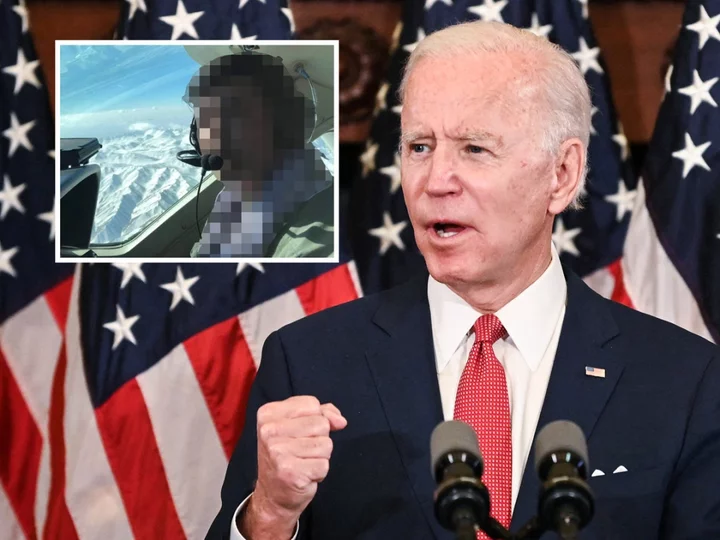
Biden turns up heat on UK over asylum for Afghan hero pilot
The White House has said it will “make sure” Afghan veterans who supported the US are taken care of – while the British government continues to stall in the case of an Afghan pilot who has been threatened with deportation to Rwanda. The pilot, who risked his life on combat missions in support of coalition forces, has been left in limbo and has been threatened with removal after he arrived in Britain on a small boat because of the lack of safe legal routes. After the UK rejected his first application to remain, Washington is now considering his case after his US supervisor made a personal recommendation and described him as a “true patriot to his nation”. President Joe Biden’s spokesperson was asked about the speed at which Afghans were being brought to the US, especially from third countries, in light of The Independent’s campaign on behalf of Afghan veterans. Karine Jean-Pierre replied: “Our commitment continues to stand. To make sure that we take care of the folks who helped us during the longest war in this country that we have, we have seen that we have supported and the work continues.” The intervention turns up the heat on the UK which has still not removed the threat of deportation to Rwanda, despite the UK’s Court of Appeal ruling that the government’s agreement is illegal. Without the notice being removed, the pilot’s application for asylum cannot progress and he is still being refused safe haven. Dozens of military chiefs, politicians, diplomats and celebrities have joined in The Independent’s call for him to be given safe refuge after the sacrifice he made. The Afghan air force airman, whose wife and child are still in hiding in Afghanistan, served alongside coalition forces in the run up to the fall of Kabul two years ago. He described how he flew in missions coordinated and supported by British and US commanders to take out terrorists and eliminate drug production networks. When the coalition troops left in August 2021, the pilot was among those dangerously exposed. The Taliban took over their offices and uncovered every detail about him – his email address, his phone number and where he lived. He waited in hiding in Afghanistan for several months before making the heart-breaking decision to leave his family and find safe refuge. A long journey over land and sea culminated in a dangerous journey across the Channel last November. Thinking he would be welcomed and thanked for his sacrifice, the pilot was appalled to discover that he was threatened with deportation to Rwanda. He told The Independent: “I am really disappointed. We weren’t carrying out simple tasks in Afghanistan - we were doing your missions. Without our Afghan forces, the UK and US wouldn’t have been able to do their activities. “If the UK are abandoning us again, I hope the US may help. Many former Afghan pilots are even flying in the US, they are using their skills, unlike what the UK are doing with me. Maybe if I get to the US, I can work as a pilot again and have a future – which helps my family, who are still in danger in Afghanistan.” The pilot is not allowed to work in the UK while his asylum claim is paused and receives around £8 a week to live on while he is in government-funded hotel accommodation. He is being considered for possible sanctuary in the US under the P1 resettlement scheme, to which you have to be personally referred by a US official. His application to the Ministry of Defence’s Afghan Relocation and Assistance Policy was rejected because the government said that his pilot role was not one in which “the UK’s operations in Afghanistan would have been materially less efficient or materially less successful if a role of that nature had not been performed”. Defence minister James Heappey had said that members of the Afghan air force would not qualify “in principle” for the scheme because they were not embedded with the British. Sign The Independent’s petition calling for UK to support Afghan war heroes who served alongside Britain He is among thousands of other asylum seekers who have arrived in Britain on small boats, and who could face removal to Rwanda by the UK Home Office. The notice of intent letter, issued by the government, said his asylum claim was “inadmissible” because he had travelled through a number of European countries before arriving in Britain. The £140m deal to deport asylum seekers from UK to Rwanda was ruled unlawful at the end of June, but the Home Office have refused to remove the pilot’s notice of intent – meaning his asylum claim cannot be processed. Prime minister Rishi Sunak has pledged to appeal the court’s unlawful ruling in the Supreme Court. The former head of the British Army, General Sir Richard Dannatt, has previously described the Rwanda plan as an “unpopular policy”, and blamed the home secretary Suella Braverman for “continuing to run down the remaining political capital of Rishi Sunak’s government” by pursuing it. A government spokesperson said: “Whilst we don’t comment on individual cases, we remain committed to providing protection for vulnerable and at-risk people fleeing Afghanistan and so far have brought around 24,500 people impacted by the situation back to the UK. “We continue to work with like-minded partners and countries neighbouring Afghanistan on resettlement issues, and to support safe passage for eligible Afghans.” Read More US pledges to investigate Afghan pilot’s case as UK stalls on offer to help Democrats and Republicans say they want to help Afghan veterans. So why haven’t they done anything? Afghanistan withdrawal may have left members of armed forces with ‘moral injury’ Biden arrives in UK to meet Sunak and King Charles amid Ukraine concerns Joe Biden to meet with the King at Windsor Castle Biden touches down in UK ahead of meeting with Sunak
1970-01-01 08:00
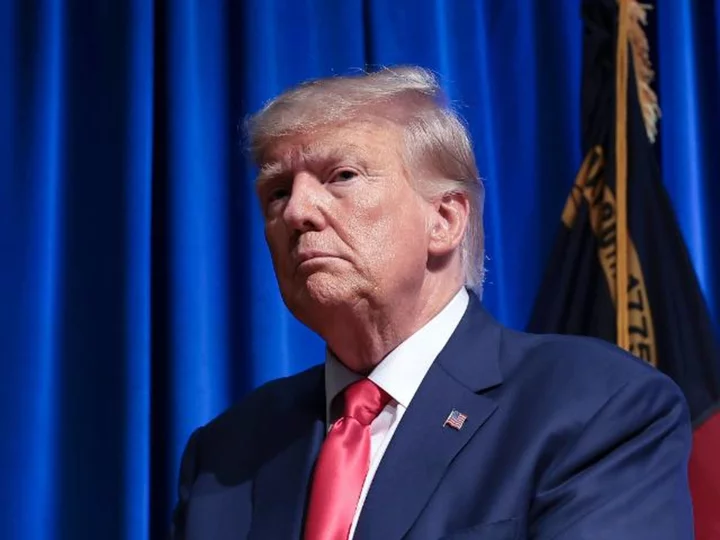
Trump bets, again, on legal troubles yielding big donations
Recent campaign filings underscore just how much the former President's legal troubles boosted campaign donations.
1970-01-01 08:00
